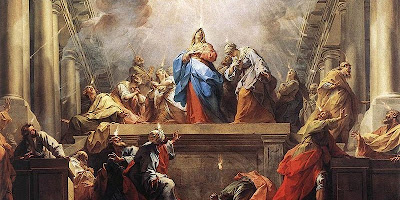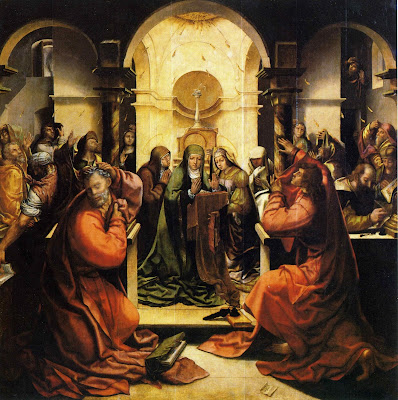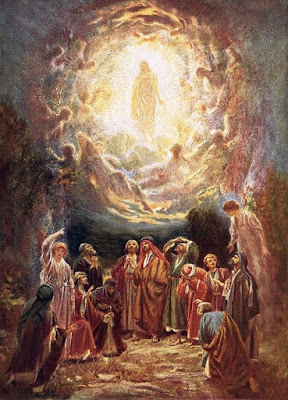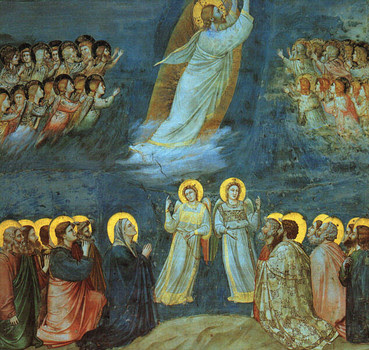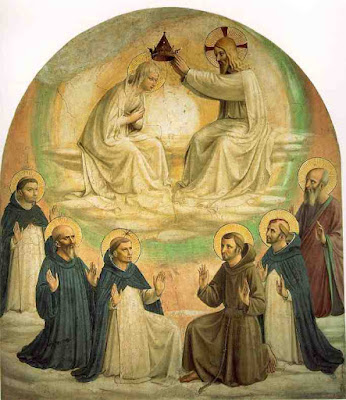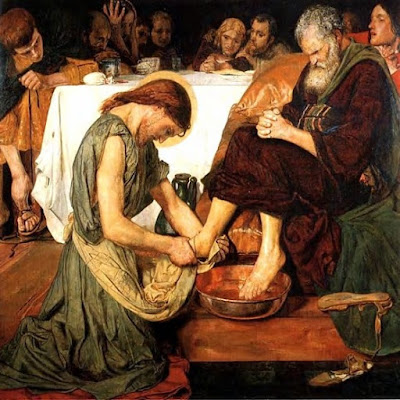The Coronation of the Virgin, Fra Angelico
May is traditionally a time of growth in regard to nature, and for the
Church at least some of Eastertide falls in May, and occasionally all of the
month falls with in this great season. May has traditionally been
associated with Our Lady, with a number of wonderful feast days: Our
Lady of Fatima on 13th May, the Feast of the Queenship of Mary (31st
May) according to the 1962 missal, and on the same date is celebrated
the Visitation according to the modern missal. The Christian custon of
dedicating this month to the Blessed Virgin Mary arose at the the end of
the 13th Century, and over time various devotions have become
associated with the month.
In 1954 Pope Pius XII issued the Papal Encyclical Ad Caeli Reginam
some of which is reproduced here:
“...if Mary, in taking an active part in the work of salvation, was, by
God's design, associated with Jesus Christ, the source of salvation itself,
in a manner comparable to that in which Eve was associated with Adam,
the source of death, so that it may be stated that the work of our
salvation was accomplished by a kind of "recapitulation," in which a
virgin was instrumental in the salvation of the human race, just as a virgin
had been closely associated with its death; if, moreover, it can likewise
be stated that this glorious Lady had been chosen Mother of Christ "in
order that she might become a partner in the redemption of the human
race"; and if, in truth, "it was she who, free of the stain of actual and
original sin, and ever most closely bound to her Son, on Golgotha
offered that Son to the Eternal Father together with the complete
sacrifice of her maternal rights and maternal love, like a new Eve, for all
the sons of Adam, stained as they were by his lamentable fall," then it
may be legitimately concluded that as Christ, the new Adam, must be
called a King not merely because He is Son of God, but also because He
is our Redeemer, so, analogously, the Most Blessed Virgin is queen not
only because she is Mother of God, but also because, as the new Eve, she
was associated with the new Adam.
Certainly, in the full and strict meaning of the term, only Jesus Christ,
the God-Man, is King; but Mary, too, as Mother of the divine Christ, as
His associate in the redemption, in his struggle with His enemies and His
final victory over them, has a share, though in a limited and analogous
way, in His royal dignity. For from her union with Christ she attains a
radiant eminence transcending that of any other creature; from her union
with Christ she receives the royal right to dispose of the treasures of the
Divine Redeemer's Kingdom; from her union with Christ finally is
derived the inexhaustible efficacy of her maternal intercession before the
Son and His Father.
In order to understand better this sublime dignity of the Mother of God
over all creatures let us recall that the holy Mother of God was, at the
very moment of her Immaculate Conception, so filled with grace as to
surpass the grace of all the Saints. Wherefore, as Our Predecessor of
happy memory, Pius IX wrote, God "showered her with heavenly gifts
and graces from the treasury of His divinity so far beyond what He gave
to all the angels and saints that she was ever free from the least stain of
sin; she is so beautiful and perfect, and possesses such fullness of
innocence and holiness, that under God a greater could not be dreamed,
and only God can comprehend the marvel."
Coronation of the Virgin, Fra Angelico (Louvre)
Besides, the Blessed Virgin possessed, after Christ, not only the highest
degree of excellence and perfection, but also a share in that influence by
which He, her Son and our Redeemer, is rightly said to reign over the
minds and wills of men. For if through His Humanity the divine Word
performs miracles and gives graces, if He uses His Sacraments and Saints
as instruments for the salvation of men, why should He not make use of
the role and work of His most holy Mother in imparting to us the fruits
of redemption? "With a heart that is truly a mother's," to quote again
Our Predecessor of immortal memory, Pius IX, "does she approach the
problem of our salvation, and is solicitous for the whole human race;
made Queen of heaven and earth by the Lord, exalted above all choirs of
angels and saints, and standing at the right hand of her only Son, Jesus
Christ our Lord, she intercedes powerfully for us with a mother's
prayers, obtains what she seeks, and cannot be refused." On this point
another of Our Predecessors of happy memory, Leo XIII, has said that an
"almost immeasurable" power has been given Mary in the distribution of
graces; St. Pius X adds that she fills this office "as by the right of a
mother."
Let all Christians, therefore, glory in being subjects of the Virgin Mother
of God, who, while wielding royal power, is on fire with a mother's
love.
The happy birds Te Deum sing,
'Tis Mary's month of May;
Her smile turns winter into spring,
And darkness into day;
And there's a fragrance in the air,
The bells their music make,
And O the world is bright and fair,
And all for Mary's sake.
Where'er we seek the holy Child,
At every sacred spot,
We meet the Mother undefiled;
Who shun her seek him not:
At cloistered Nazareth we see.
At haunted Bethlehem,
The throne of Jesus, Mary's knee,
Her smile, his diadem.
The Daughter, Mother, Spouse of God,
None silence her appeal
Who long to tread where Jesus trod,
What Jesus felt to feel.
O, Virgin-born, from thee we learn
To love thy Mother dear;
Her teach us duly to discern.
And rightly to revere.
To love the Mother, people say,
Is to defraud the Son.
For them, alas, there dawns no May,
Until their hearts are won:
Then, when their hearts begin to burn.
Ah, then, to Jesus true,
And loving whom he loves, they learn
To love Saint Mary too.
How many are the thoughts that throng
On faithful souls to-day!
All year we sing our Lady's song,
'Tis still the song of May:
Magnificat! O may we feel
That rapture more and more;
And chiefly, Lord, what time we kneel
Thine altar-throne before.
'Tis then, when at thy feet we pray,
We share our Lady's mirth;
Her joy we know who hail to-day
Thy Eucharistic birth;
That trembling joy to Mary sent,
Ah, Christians know it well,
With whom in his dear sacrament
Their Saviour deigns to dwell.
Yes, Mary's month has come again,
The merry month of May;
And sufferers forget their pain,
And sorrows flee away,
And joys return, the hearts whose moan
Was desolate erewhile
Are blithe and gay - once more they own
The charm of Mary's smile.
Thy Son our Brother is, and we,
Whatever may betide,
A Mother, Mary, have in thee,
A guardian and a guide;
Thy smiles a tale of gladness tell
No words can ever say?
If but, like thee, we love him well,
The year will all be May.
All hail! An angel spake the words
We lovingly repeat;
The song-notes of the singing birds
They are not half so sweet:
This is a music that endures,
It cannot pass away,
For Mary's children it ensures
A never-ending May.
